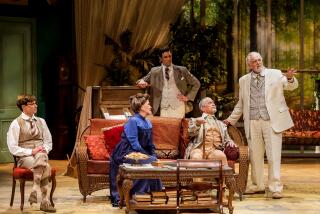BOOK REVIEW : Marriages and Machinations at Oxford : INVITATION TO THE MARRIED LIFE, by Angela Huth , Grove Weidenfeld, $19.95; 290 pages
- Share via
The ghost of Jane Austen must be savoring a reviewer’s copy of Angela Huth’s novel, pleased to find that one can still write engagingly about love and marriage in the English countryside. Thoroughly contemporary, quietly witty; poignant without ever slipping into sentimentality, this is just the book to offset the 11 o’clock news.
Set in the immediate environs of Oxford, “Invitation to the Married Life” is essentially plotless in any ordinary sense. Eight assorted people--three married couples, one lovelorn bachelor, and a spirited, independent woman artist, are all invited to an elaborate ball to be given by a fourth pair, Frances and Toby Farthingoe. Though a few of the eight guests are well-known to one another or even related, most are only slightly acquainted.
The novel is propelled by subtly deepening and changing connections among the characters. For the most part, the stories proceed individually, fusing only at the end when the long-anticipated dinner-dance finally takes place. Grand as it is, the ball is merely the device that allows us to observe these disparate but coalescing lives in the months before the event itself.
The hostess, Frances Farthingoe, is actually the only character preoccupied with the ball. Her husband Toby, a financial wizard whose quixotic avocation is badger-watching, is indulgent and indifferent, happy to sign enormous checks to caterers, florists and musicians as long as Frances doesn’t bother him with the details.
Though Frances yearns to do something more worthwhile with her organizational and artistic talents than party-giving, there aren’t many professional opportunities open to someone with only “ ‘flair’ to put on a resume.”
Her daughter is growing up, her old beau Ralph Cotterman has announced that he’s no longer willing to play the role of heartbroken admirer, and Toby is now taking his sleeping bag into the woods at night to see more of the badgers. Frances has reached an emotional impasse. Treated with gentle irony, Frances is not in the least ridiculous.
Rachel and Thomas Arkwright have a different kind of unenviable marriage. Middle age and dreary routine have combined to make Thomas indiscriminately lecherous and Rachel chronically sleepy. While he tomcats around, she takes increasingly long naps in her newly decorated bedroom, exhausted from the strain of ignoring her husband’s escapades. Roused to action by a broad hint from her sister, she flirts with her dinner partner at an Oxford party, a disastrous but useful experiment in assertiveness.
The object of her attention at that dinner is Martin, a university professor whose marriage to Ursula would serve as a model of domestic tranquillity except for the fact that Ursula loathes Oxford, a fact too fraught with implication even to be mentioned between them.
Mary and Bill Lutchins, the parents of Ursula, are older than the others, living in blissful, symbiotic retirement in the countryside. Apparently hale and hearty, Bill cultivates his arboretum, reads all the books he had no time for earlier, and is attentive and affectionate to his adoring wife. Mary’s secret terror is that she will die and leave Bill bereft; a fear she tries valiantly to conceal and he tries even more valiantly to assuage.
While learning about the machinations within these marriages, we simultaneously become acquainted with the landscape painter Rosie Cotterman, a charmingly capricious artist excessively admired by Thomas Arkwright, a Sunday painter himself. When he finally meets her, his admiration turns to adoration, despite the fact that she’s considerably his senior.
Hopeless as this passion is, it not only serves to cure him of his predilection for girls young enough to be his daughter, but persuades him to make more of an effort with Rachel. Noticed for the first time in years, she responds like Sleeping Beauty to the Prince’s kiss, for reasons that have nothing to do with her husband.
Ralph Cotterman, Rosie’s son and our bachelor, is the only one of the Farthingoe’s guests whose future is unresolved by the morning after the ball, though he has had by far the most extraordinary romantic experience of all; an adventure certain to convince him that he’s both attractive and lovable.
Beguiling and piercingly insightful, “Invitation to the Married Life” is proof positive that two out of the three classic ingredients for a novel are more than enough. You don’t need plot if you have character and setting--and if you’re Austen’s natural heir.
More to Read
Sign up for our Book Club newsletter
Get the latest news, events and more from the Los Angeles Times Book Club, and help us get L.A. reading and talking.
You may occasionally receive promotional content from the Los Angeles Times.










